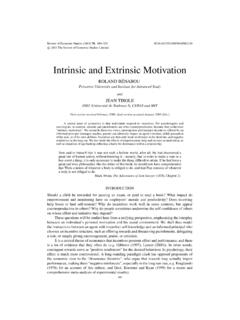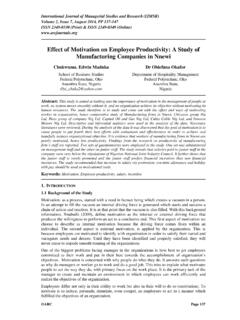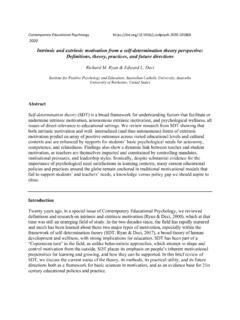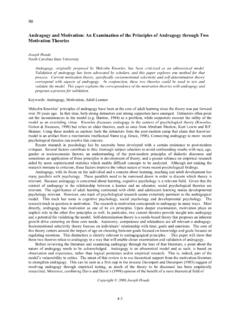Transcription of The Motivation of Learners of English as a Foreign ...
1 International Education Studies; Vol. 6, No. 10; 2013 ISSN 1913-9020 E-ISSN 1913-9039 Published by Canadian Center of Science and Education 90 The Motivation of Learners of English as a Foreign Language Revisited Hsuan-Yau Tony Lai1 1 Department of Applied Foreign Languages, National Taipei College of Business, Taipei City, Taiwan Correspondence: Hsuan-Yau Tony Lai, Department of Applied Foreign Languages, National Taipei College of Business, Taipei City, 100, Taiwan. Tel: 886-2-2322-6607. E-mail: Received: August 26, 2013 Accepted: September 26, 2013 Online Published: September 28, 2013 URL: Abstract This study investigates Taiwanese university students' English learning orientation from the perspective of various important L2 Motivation concepts (from Gardner's integrativeness/instrumentality to D rnyei's L2 motivational self system) and the notion of English as an international language.
2 The uniqueness also lies in its comparison and contrast of both day and night school students' Motivation for studying English . A total of 267 undergraduate students from a science and technology university in New Taipei City, Taiwan, participated in this survey study. The results show that the majority of the participants studied English for travel, instrumental and integrative orientations, as well as intrinsic Motivation and the ideal L2 self, but not for external pressure and the ought-to L2 self. No significant difference was found between day and night school students' Motivation for studying English .
3 The term "integrativeness/integrative orientation", which has been rooted in L2 Motivation research for decades, is re-examined in this study, especially with the current important status of the English language in the world. This paper will consider possible implications for English language professionals to reconceptualise and re-approach EFL Learners ' Motivation to study English . Keywords: Motivation , English as an international language, ideal self, ought-to self 1. Introduction Motivation is perhaps one of the most important elements in the process of second/ Foreign language learning.
4 It has a huge impact on an L2 learner s learning outcome. L2 Motivation research has gone through different stages and researchers have conceptualised various L2 Motivation models in the field, from Gardner s socio-educational model (1985, 2001, 2005) to D rnyei s L2 Motivational Self System (2005, 2009, see also D rnyei & Ushioda, 2011). Many researchers have contributed to L2 Motivation research in various contexts, such as English as a Second Language (ESL) and English as a Foreign Language (EFL). One of the founders of L2 Motivation research is perhaps Gardner and his associates in Canada, with their proposed socio-educational model featuring integrativeness/integrative Motivation and instrumentality.
5 However, in recent years, Gardner s (1985, 2001, 2005) concept of learning a second language in order to get closer to another language community has been questioned. With the increasing importance of English and its current status as the most important international language in today s world, do English Learners study English in order to get closer to particular communities (in the case of the English language, English -speaking countries/communities)? In Taiwan, English is taught and learnt as a Foreign language (an EFL context). Most students in Taiwan have little or no contact with the native speakers of English ; however, studying English seems to have become a national activity among school pupils, company employees and others in Taiwan due to its important global status.
6 The paper aims to explore Taiwanese students Motivation for studying English from the perspectives of English as an international language and the latest L2 Motivation theory (the L2 Motivational Self System). As well as this major aim, in this study, a comparison and contrast between day and night school students English learning Motivation will also be discussed. In Taiwan, many universities have both day and night programmes within the same academic department ( the English department). Normally, night school students come to campus to attend classes in the evening. After they meet the requirements for graduation, they will be awarded a bachelor s or a master s degree as day school students are.
7 From my personal teaching observation as a university English teacher of both English -major and non- English -major students, I have found from time to time that most night school students tend to have strong Motivation and show enthusiasm for learning English , even after they have a International Education Studies Vol. 6, No. 10; 2013 91 hard day at work. Some of them want to improve their English knowledge because they need it for work, for travel or purely and simply because they want to study English for pleasure and enjoyment, which inspires them to enrol on the night programme.
8 On the other hand, some day school students seem to lack Motivation in the English classroom. As Chern (2002, p. 97) argues, in Taiwan, "students Motivation for learning English has remained at the level sufficient either to fulfil the course requirements or to pass the entrance examinations to the next level of schooling." These observations have triggered the present study, which aims to explore Taiwanese English Learners Motivation for studying English with an emphasis on a comparison and contrast of both day and night school students. 2. Literature Review In this literature review, relevant theories and concepts about L2 Motivation will be discussed.
9 Gardner s Motivation Theory Gardner s Motivation theory has been profoundly influential in the L2 Motivation field for decades. According to Gardner (2001), Motivation includes three elements effort (the effort to learn the language), desire (wanting to achieve a goal) and positive affect (enjoy the task of learning the language). The role of orientations, which Gardner refers to as a "goal" aims to arouse Motivation and direct it to reach the goals (Gardner, 1985). Two orientations in particular integrative orientation and instrumental orientation were introduced by Gardner and his associates and have been discussed and explored in L2 Motivation research extensively.
10 According to Gardner (1985), integrative orientation refers to a positive attitude towards the L2 community and the desire to get close to the community and even become a member of that community. As a counterpart to integrative orientation, instrumental orientation is defined as learning an L2 for pragmatic reasons, such as getting a better job or a higher salary. The most influential and well-known embodiment of Gardner s Motivation theory is perhaps the socio-educational model. The model was first proposed by Gardner and Smythe (1975) and has undergone a number of changes since then (see, for example, Gardner, 1985; Gardner & MacIntyre, 1993; Gardner, 2000; Gardner, 2005).

















